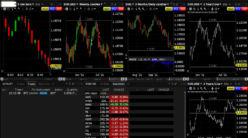Are you familiar with stocks and stock orders? Do you understand the different types of stock orders available, or would you like to know more about this helpful investing tool? This article dives deep into various kinds of stock orders so that you can understand precisely how they work and how best to use them.

You will gain insight into the decision-making process for each type and the advantages and risks associated with each one. Whether you are just starting investing or a reliable trader, there is something here for everyone interested in learning about using stock order to get ahead financially. Read on to learn more.
Overview of stock orders
Investing in stocks can be a daunting task, especially for those who are new to the game. The first step in buying and selling shares is placing a stock order. But what exactly is a stock order, and how does it work? A stock order is a request to purchase or sell a certain amount of shares in a particular company.
There are several types of stock orders, each with unique advantages, depending on the investor’s goals and preferences. For example, limit orders allow investors to buy or sell shares at a predetermined price, while market orders execute the trade at the current market price. Understanding the basics of stock orders is crucial for investing in the stock market.
Types of stock orders
Now that you understand a stock order let’s look at the available types. The most basic type of stock order is a market order. This type of order will execute immediately at the current market price for the amount of shares specified in the request. Market orders are ideal if you want to buy or sell shares quickly, but they can also carry more risk as you won’t be able to specify the price.
A limit order is another popular type of stock order that allows investors to buy or sell at a predetermined price. It means you will only pay the specified amount for the share regardless of whether market prices rise or fall. Limit orders can be beneficial if you are looking to buy or sell shares at a cheaper price.
Finally, there are stop orders, which allow investors to place limits on their losses. The order will only be executed when market prices fall to a certain predetermined point. These types of orders can be used as safety measures for those wanting to protect their investments from sudden drops in stock prices.
Considerations for choosing the right type of order
When deciding which type of stock order to use, it’s essential to consider your personal goals and risk tolerance. For example, those looking for a quick sale should opt for market orders, while investors looking for more control over their purchase prices should go with limit or stop orders. Ultimately, the decision is up to you as an investor and what works best in achieving your financial goals.
The stock market can be tricky, but with the proper knowledge and strategies, it can be gratifying. Understanding the various types of stock orders is a vital part of mastering this investing tool, so take the time to research and ensure you are comfortable with each type before using them in your trading strategy.
Benefits and risks associated with each type of order
Each type of stock order has its unique advantages and disadvantages. Market orders are quick and convenient, but they can also involve a higher risk as the final purchase price will depend on what is happening in the market at any given time. Limit orders provide more control over pricing, but they can take longer to execute if prices don’t reach the desired level. Stop orders are great for preventing significant losses but can also lead to missing out on potential profits due to the predetermined limit.
It’s essential to remember these risks when choosing a stock order, as investing is always associated with some degree of risk. Before placing any orders, be sure to research and understand what each type entails to make an informed decision.
Tips for executing successful stock orders
The key to executing successful stock orders is being prepared and educated. Make sure you understand the type of order you are placing, as well as any associated risks. Additionally, it’s essential to research before making any trades to know what prices you should expect when buying or selling shares.
Finally, it can be helpful to set up alerts with your broker so that you know when a specific stock reaches specific prices. This way, you can keep an eye on the market without constantly monitoring it. With these tips in mind and the knowledge of different types of stock orders, you are well-equipped to take advantage of this helpful investing tool and make informed decisions when investing in stocks.





